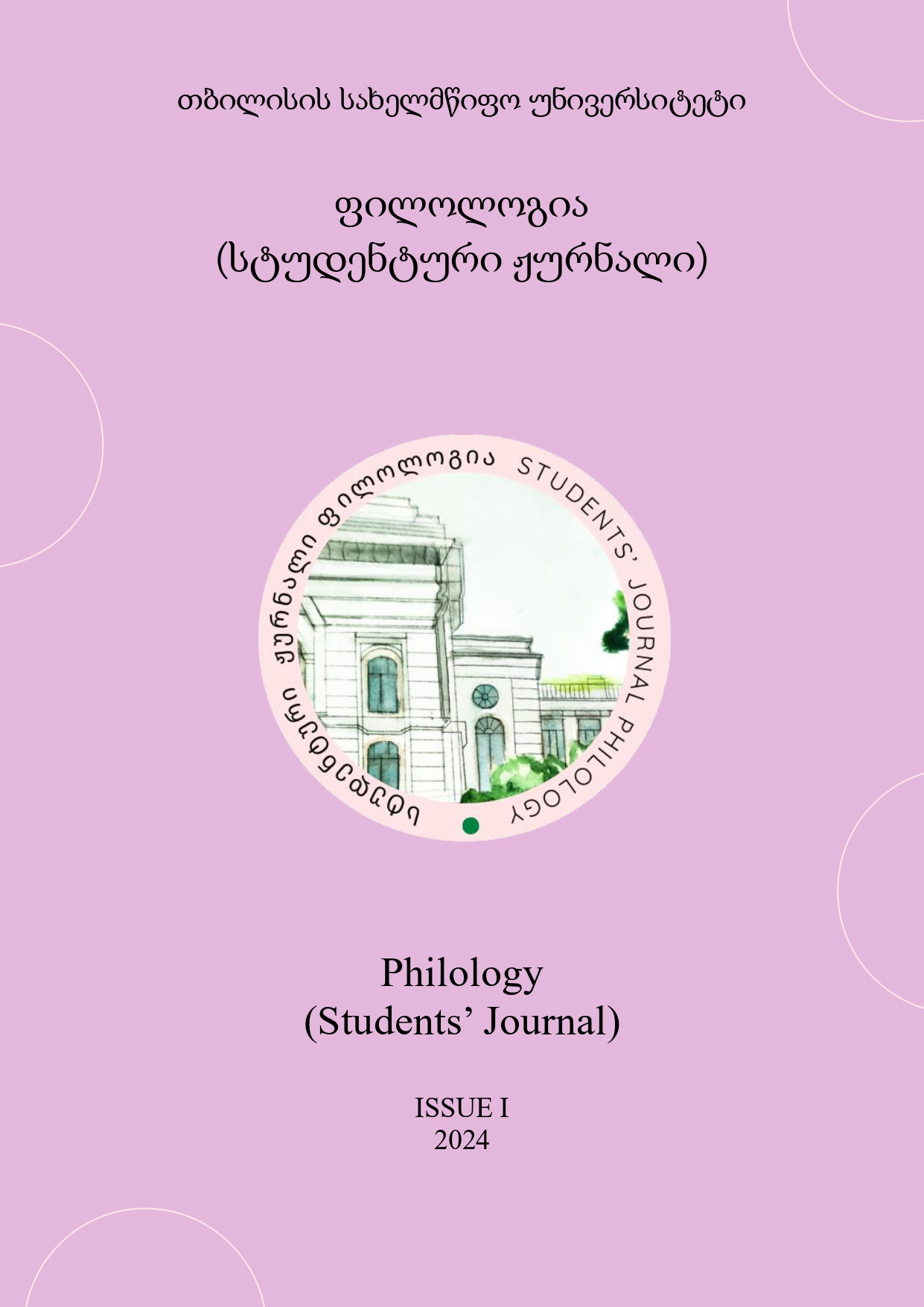The Language of Indirect/Direct Aggression among Georgian Politicians
Keywords:
Georgian politicians, Gender, Language of aggressionAbstract
კვლევა გახლავთ პირველი მცდელობა იმისა რომ, გამოვიკვლიოთ პირდაპირი და არაპირდაპირი აგრესიის ენა ქართველ პოლიტიკოსებს შორის. მთავარი ყურადღება ეთმობა, მათ მეტყველების მახასიათებლებს. ამასთანავე, განსაკუთრებით გვაინტერესებს შეიმჩნევა თუ არა გენდერული განსხვავება აგრესიის გამოხატვის დროს. სტატია მოიცავს 5 ვიდეოს, რომლებიც აღებულია ქართული პოლიტიკური თოქ-შოუებიდან და პარლამენტის 3 პლენარული სხდომიდან. კვლევა მიმდინარეობდა 2 თვის განმავლობაში, სექტემბერსა და ოქტომბერში.
კვლევის მეთოდოლოგიაში ვიყენებთ დისკურსის კრიტიკულ ანალიზს, რაც გულისხმობს, წერილობითი ტექსტების და ვიდეოების ანალიზს აგრესიის ენის გამოსაკვეთად.
კვლევის დასაწყისში სხდასხვა მახასიათებლები შეიმჩნევა პოლიტიკურ დებატებში. პირველადი დაკვირვების საფუძველზე ეს ეხება არათავაზიან გამონათქვამებს. შესაბამისი ინფორმაციის ფლობამ უფრო გაამარტივა იმ მიზეზების აღმოჩენა, თუ რატომ იყენებდნენ ისინი აგრესიის ენას. შემდგომ, დავიწყეთ ქალი და მამაკაცი პოლიტიკოსების მეტყველების მსგავსების შედარება. მათ მეტყველებაში აგრესიის ენის აღმოჩენამ შესაძლებლობა მოგვცა, გვეპოვნა ამ ყოველივეს გამომწვევი ერთ-ერთი მთავარი მიზეზი. შეგროვებული მასალა ასევე მოიცავდა პარლამენტის პლენარულ სესიებს. გამოიკვეთა, რომ პლენარულ სესიებსა და პოლიტიკურ ვიდეოებში გამოყენებული ლინგვისტური მახასიათებლები განსხვავდებოდა პოლიტიკური თოქ-შოუებიდან აღებული მასალისგან. მიუხედავად ამისა, არ გამოვლინდა რაიმე გენდერული განსხვავებები პირდაპირი და არაპირდაპირი აგრესიის გამოხატვის დროს.
გამოყენებული თვისობრივი მეთოდოლოგია გვიჩვენებს მონაწილეთა რაოდენობას და კონკრეტულ მასალას. დამატებით, კვლევაში ასევე ნახსენებია პირდაპირი და ირიბი უშუალო აგრესიის ფორმები.
კვლევა გვიჩვენებს თუ როგორ იყენებენ ქართველი პოლიტიკოსები აგრესიის ენას და განსაკუთრებით კარგად გამოიკვეთა, რომ არ არსებობს გენდერული ზღვარი თუ განსხვავებები აგრესიის გამოხატვის დროს.
References
Archer, J. (2004). Sex differences in aggression in real-world settings: A meta-analytic review. Review of General Psychology, 8(4), 291-322. doi:10.1037/1089-2680.8.4.291
Ben Shitrit, L., Elad-Strenger, J., & Hirsch-Hoefler, S. (2017). Gender differences in support for direct and indirect political aggression in the context of protracted conflict. Journal of Peace Research, 54(6), 733–747. https://doi.org/10.1177/0022343317714301
Bjorklund, D. F., & Pellegrini, A. D. (2000). Child development and evolutionary psychology. Child Development, 71(6), 1687–1708. https://doi.org/10.1111/14678624.00258
Card, Noel A; Brian D Stucky, Gita M Sawalani & Todd D Little (2008) Direct and indirect aggression during childhood and adolescence: A meta-analytic review of gender differences, intercorrelations, and relations to maladjustment. Child Development 79(5): 1185–1229.
Conover, P. J., & Sapiro, V. (1993). Gender, feminist consciousness, and war. American Journal of Political Science, 37(4), 1079. https://doi.org/10.2307/2111544
Da Gloria, J., & De Ridder, R. (1979). Sex differences in aggression: Are current notions misleading? European Journal of Social Psychology, 9(1), 49–66. https://doi.org/10.1002/ejsp.2420090105
Eagly, A. (1987). Sex differences in social behavior:A social role interpretation. Hillsdale, NJ:Erlbaum
Eagly, A. H., Wood, W., & diekman, A. B. (2000). Social Role Theory of sex differences and similarities a current appraisal. in T. Eckes, & H. M. Trautner (eds.), the developmental social psychology of gender (pp. 123-174). Mahwah, NJ Erlbaum. references - scientific research publishing. (n.d.). https://www.scirp.org/(S(lz5mqp453edsnp55rrgjct55))/reference/ReferencesPapers.as px?ReferenceID=442750
Golan, G. (2015). Militarization and gender in Israel. Pioneers in Arts, Humanities, Science, Engineering, Practice, 221–235. https://doi.org/10.1007/978-3-319-952130_11
HARUTYUNYAN, R. (2020). Linguistic means of expressing verbal aggression in political communication. Foreign Languages in Higher Education, 24(1 (28)), 52–63. https://doi.org/10.46991/flhe/2020.24.1.052
Hyde, J. S. (1984). How large are gender differences in aggression? A developmental meta-analysis. Developmental Psychology, 20(4), 722–736. https://doi.org/10.1037//0012-1649.20.4.722
Maccoby, E. E., & jacklin, C. N. (1974). the psychology of sex differences. Stanford, CA Stanford University Press. - references - scientific research publishing. (n.d.). https://www.scirp.org/(S(i43dyn45teexjx455qlt3d2q))/reference/ReferencesPapers.as px?ReferenceID=1268315


